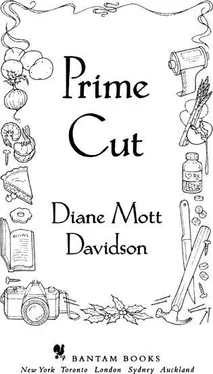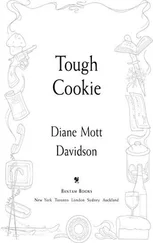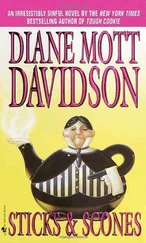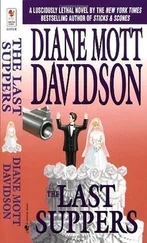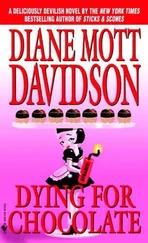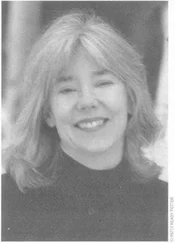“Goldy!” Hanna exclaimed. The authoritarian tone of the former director of docente still had the power to freeze my spine. “What just happened?”
“André just wanted to see the crime scene,” I commented lightly as I rebalanced the cups. “He’s fine! Don’t worry.”
Not one of them said a word.
Chapter 10
Finally Leah blinked, as if she were coming out of a reverie. She raked her streaked, shaggy hair with her fingers. “Well, fine. We’re done for today. Please tell Sylvia I’ll see her on Tuesday. And you and André too, I guess.”
I nodded. Hanna closed her eyes rather than look at the violated cabinets, somehow managing to convey her conviction that neither the burglary nor the murder would ever have happened if she’d still been in charge at the museum. Ian gruffly ordered Rufus to start packing up the lights and the set. I hustled my tray to the kitchen and asked André how he was feeling. He again assured me he was fine. As if to prove it, he delicately placed plates into the tublike porcelain sink that Julian had filled with soapy water. Sylvia, once so desirous of our company and our coffee, now did her best to shoo us off.
“How much longer will this cleaning take? I need to bring the fourth graders out here!” she fussed. As is common when someone bothers the catering crew in the kitchen, her presence actually slowed down our cleaning process. But none of us dared point that out, and she finally trundled off.
“Can we help with Monday’s food?” I asked André as Julian dried the last of André’s pans and I packed them up. “We have another assignment, but we could meet you early … please?” I’d never forgive myself if the stress of Monday’s food preparation proved to be too much for him.
“No,” he insisted stubbornly. “You make me so nervous , Goldy! You do not need to watch me all the time. For Monday, I will do a very simple coffee break and lunch.”
“Promise to call and tell me how things went,” I urged, as Mountain Taxi pulled up for him. Among his many reluctances to compromise with the times, André had never learned to drive. Julian and I loaded up the cab’s trunk. André clambered in and swore he’d stay in touch.
When we reached home, Arch solemnly assured us that Jake was on the mend. The two of them had even gone for a very short walk. To my surprise, Tom had finally taken a break from his mysterious woodworking project to fire up the grill. I was very curious to know what he was up to in the basement, but I had no intention of asking if all the banging was yielding anything beyond ventilation to his frustrations. For my own part, I’d once decided in a fit of pique to construct a gingerbread version of McNichols Arena; halfway through, the walls had collapsed. Therapy projects, I’d concluded, are usually best left undiscussed.
I set the table for lunch and noticed our checkbook jammed up beside a stack of glasses on the kitchen counter. Maybe my husband had taken a close look at our finances and that was leading him to pound nails into two-by-fours. Without looking at the check register, I knew that even with the pay from André, only two thousand dollars and change separated us from the morass known as negative cash flow . And two thousand wasn’t much when sixteen hundred of it represented payments for my two upcoming jobs, and would have to cover the costs of food and labor for those events. Moreover, two thousand was half the estimate a hardware store employee I’d called had given when he’d come by to reckon what repairing Gerald Eliot’s damage would cost. And then there were the costs of Arch’s tuition if The Jerk didn’t pay; footing the bill for the free tasting party; keeping the larder stocked for the family. Add to this only a few hundred that might come in as an extra gratuity from Weezie’s party and the Hardcastle reception, and financial disaster loomed depressingly large.
When I poured tall glasses of ice water, my stomach rumbled. Never worry about money when you’re hungry , I’d learned during my lean post-Jerk days. Luckily, deliciously scented grill smoke was curling into the kitchen. I peeked through the back door. Tom had thawed the last of our jumbo shrimp and skewered them with fresh vegetables and fruit. The man was incorrigible.
Ten minutes later, the four of us were digging into tender grilled shrimp, hot, juicy pineapple, and dark, crunchy onion. I murmured thanks to Tom; he squeezed my hand. While we ate, Julian and I filled him in on what had happened at the Homestead: the report and the denial of André’s illness, Sylvia’s distress, Rufus’s tales of Gerald Eliot’s mess at the cabin. I peppered Tom with questions: Had Eliot been seeing a woman? Specifically, had he been seeing Rustine the model? Had they found other Eliot clients who might have been willing to kill him? Tom said his buddies at the department were questioning Cameron Burr, Leah Smythe, a country-club couple in the middle of a North Atlantic cruise, and the Montessori School people, where the directress had changed since Eliot had redone a bathroom there. The investigators hadn’t been able to find other clients of Eliot’s who still lived in Aspen Meadow. All those folks, according to neighbors, had had their houses finished by other remodelers, and moved away. Tom asked if I’d obtained a last name for Rustine. I replied in the negative.
“They’re looking into Eliot’s social life,” Tom told us. “He prided himself on being a bachelor. Was frequently seen getting hammered at the Grizzly Saloon. I’ll call Boyd, see if any more evidence has turned up at Burr’s place. Maybe they’ve found the last two cookbooks, but they just haven’t told Sylvia Bevans. Maybe they won’t tell me either.”
“Look at it this way,” I reasoned, “what if we found out Cameron didn’t kill Eliot? Which he didn’t, of course. It could help to clear you, since you didn’t want to arrest him for the murder in the first place.”
Arch and Julian exchanged a look. Tom said, “Who’s we , woman? I’m suspended and you’ve got your hands full trying to hold your business together.”
I helped myself to the last succulent shrimp. “It’s just not fair that Fuller gets to do a shoddy job, then blames you.”
“You’re reaching, Goldy. Besides, it’s Fuller’s show now. If I go around asking lots of background questions, and it gets back to him, he’ll claim interference. It’ll work against the investigation into me.”
“I bet that creep Litchfield who’s harassing Goldy had something to do with it,” Julian said defiantly. “Where was he the night Eliot was strangled? What if he knew about Eliot redoing Goldy’s kitchen and wanted to get rid of him, so Goldy’s kitchen stays a mess? Then, as a bonus, Goldy’s business falls flat because she hasn’t got a kitchen, Tom gets into trouble, and she has to sell out?”
“Now you’re really reaching,” Tom murmured.
“André did say someone had put pickles in his crab cakes,” I added, “and I found a hair in the food he served on Monday—a very unlikely mistake for him to make. Food sabotage is a long way from murder, though.”
“Don’t go off on some investigative campaign, you two,” Tom warned Julian and me.
“We’ll never even mention your name,” I vowed.
“That is not reassuring,” Tom observed.

Saturday I woke up disoriented, with a vague sense of dread. I stared at the clock. Seven o’clock. Downstairs, Tom was already sawing away on his mysterious project.
The phone rang. One of Tom’s co-workers returning his calls about the evidence? No: I suddenly remembered where I was going at ten this morning. To the jail. With Arch. To visit The Jerk. Maybe this was The Jerk calling now, from the cell block pay phone.
Читать дальше
